1984读后感 英文版
小说《1984》英文赏析

小说《1984》英文赏析When finished the reading of 1984 by George Orwell, I felt a shiver down my spine. This is an anti-Utopia novel written in 1948, which is a strong criticism of Totalitarianism. This novel keenly calls for freedom. As mentioned in the New York Times, that one more person reads Orwell means one more guarantee for freedom.“Where there are how many creatures in the universe, there are how many centers. Each of us is a center. Therefore, when a hoarse voice says you are captured, the world will coll apse. ” These words from Solzhenitsyn come to my mind when I read Winston and Julia were captured in Charrington cabin. In 1984,the author creates a Totalitarian society. The world is occupied by three super powers, i.e. Oceania, Eurasia and Eastasia. The tree powers are frequently in war. Their national structure is totally destroyed. Instead, a high degree of Totalitarianism rules over the nation. History, language, etc are falsified to control people’s thought. “Telescreens” are employed to supervise pe ople’s behavior. All the society looks more like a prison. Winston, from the Oceania, originally is a person with independent thinking. Unfortunately, he was captured by t he “thought police” O’ Brien and was brainwashed to believe that two plus two equals five. And he finally yielded to the dictator Big Brother. This proves what said by Winston that “thought crime doesn’t lead to death. Instead, itself is death.” If Winston insists on his independent thought, he has to die; if Winston abandons his independent thought, he is none other than a walking dead.The pursuit for freedom is human’s nature as we are born.“Some birds aren't meant to be caged, that's all. Their feather s are just too bright.” In the film The Shawshank Redemption, Andy, who was set up to prison, spent 19 years to dig a tunnel and succeeded in breaking out of the prison. What Andy yearns for is freedom, a free body exactly. While in 1984, the freedom of Winston refers to the freedom of body and thought. In Oceania, there is “telescreens” to supervise people’s body. There is also “doublethink” to occupy people’s thought. “Doublethink” means there are two opposite thoughts within one mind, which are both acceptable. There is a case in point in 1984. When Oceania fights against Eurasia, the troops turn to attack without any doubt Eastasia after they heard from the frontline that their enemy is Eastasia rather than Eurasia. Hence, all the materials publicizing the war between Oceania and Eurasia are out of date all of sudden. These materials are replaced in a lightning speed. On the one hand, people are delicately devising lies. On the other hand, they truly believe in these lies. What is truth? Truth may be lies packaged by lies or be the deformed memories.It is quite interesting that those imprisoned never eve think of breaking out. Is it because they have no idea that they are in prison? The answer is no. Actually, the smarter people are, the more mediocre the ir thought may be. “Thought Police” O’ Brien is a good example. He knows clearly that the society is retrogressing. His choice is to be a screw in the machine-like system full of lies. Thus, he has to be under supervision of the Big Brother. O’ Brien cannot be regarded as an “Evil of banality” proposed by Hannah Arendt, but a sensib le devil. As pursuit for freedom is our nature, why O’ Brien gives up his nature? Maybe Fromm can give us an answer.Fromm analyzes the reason why Nazi can seize the Germanyin his work Escape from Freedom. In his opinion, those who escape are both sadist and masochist. On the one hand, they want to control everything, to destroy everything. On the other hand, in their sub-consciousness, they convert the social conventions into their own experience to avoid free thinking and to get away from anxiety. O’ Br ien may be in this way. The freedom per his understanding means not only the rule over himself, but also the rule over the others. However, this kind of freedom is analienation of liberty and is also a disrespect. Meanwhile, he internalized the “truth” pu blicizing in the T otalitarian society as his own thought. He puts himself in a morbid system and becomes part of the overall environment. He is bound by the environment. He is also dependant on the environment. He even enjoys the environment. O’ Brien is s imilar to Brooks Hatlen in the film of The Shawshank Redemption. Brooks is not willing to leave prison after his 50 years’ stay. Because once he leaves prison, what he feels is not freedom but the terror of being free. What freedom means to Brooks is the loss of his position in prison. Out of prison, there is nothing for him to count on. What is left is only his lonely heart and mind. His fear for freedom causes his suicide.Freedom imprisoned in a cell is not a real one. Could a bird be free just because it is allowed to sing in a cage? Obviously not. Freedom under manipulation is an extreme freedom. A circle in a blank paper may intersect with each other as long as they keep e nlarging. Actually, an uninterrupted freedom doesn’t exist. This reflects the true meaning of the last words by Mrs. Ronald, i.e. freedom, that crimes are committed in thy name. Freedom full of sense of slavery is a Cynicism freedom. As said by the BigBro ther “Freedom is slavery”, human would be no more than the “existence under the level biological vegetable” said by Havel, if everyone yields to the supervision and abandons their ability to think.“We will meet in a place without darkness.” This is the pr omise that O’ Brien made for Winston. In the end of the novel, O’ Brien fulfills this promise. Winston becomes a total “free person in a cell” due to the reformation of O’ Brien. Winston is grateful to O’ Brien for giving him the freedom as big as the bottom of a well. The tragedy in 1984 of is worth contemplation.。
英文读后感范文 (2)

英文读后感范文Title: My Reading Experience of "1984" by George OrwellIntroduction"1984" is a dystopian novel written by George Orwell in 1949, depicting a totalitarian government in a society where individualism and independent thinking are suppressed by the state. The book was written at the end of World War II, a time of political and social upheaval, and serves as a cautionary tale about the dangers of totalitarianism and the importance of individual freedom.Personal Reading Experience and FeelingsAs I read "1984," I was struck by the bleak and oppressive world that Orwell created. The story follows the protagonist, Winston Smith, as he navigates life in a society where government surveillance is constant, propaganda and censorship are ubiquitous, and even thought crimes are punishable. As someone who values freedom and individuality, I found the novel to be incredibly unsettling.One of the most powerful aspects of the novel for me was the way Orwell portrayed the psychological effects of living in a society like the one he describes. Winston Smith is constantly afraid of being caught by the "Thought Police," and this fearpervades every aspect of his life. He is unable to trust anyone, including his closest friends and even his lover. This sense of isolation and paranoia was incredibly compelling and made me think about the ways that fear can be used to control people.Importance of the BookIn my opinion, "1984" is an incredibly important book that everyone should read. The novel serves as a warning about the dangers of totalitarianism and the importance of individual freedom. By showing the extreme measures that a government can take to control its citizens, Orwell makes a compelling case for the need to protect individual rights and liberties.Furthermore, the novel sheds light on the power of language and communication. In the world of "1984," language is used as a tool of oppression, with the government controlling the words and phrases that people can use to express themselves. This made me think about the ways that language can be used to shape our perceptions of reality, and the importance of preserving the diversity of voices and perspectives in society.Innovative Thoughts and PerspectivesAs I finished "1984," I found myself thinking about the ways that the themes of the novel still resonate in our world today. While we may not live in a society quite as extreme as the one Orwell describes, we still face challenges to our individual freedoms and privacy. The rise of technology and social media hascreated new ways for governments and corporations to monitor our lives, and the power of language and communication is still a central issue in our society.One innovation that I think is particularly relevant to the themes of "1984" is the rise of blockchain technology. Blockchain is a decentralized system of record keeping that allows for secure transactions and data storage without the need for a central authority. This technology has the potential to disrupt the centralized power structures that enable government surveillance and censorship, and could provide a new way for individuals to maintain their privacy and autonomy.In conclusion, "1984" is an incredibly important and powerful novel that has much to offer readers in terms of insight into the dangers of totalitarianism and the importance of individual freedom. While the world that Orwell describes may seem extreme, the themes of the novel are still relevant in our world today, and there is much that we can learn from Winston Smith's struggle to maintain his humanity in the face of oppression.。
1984英语读后感
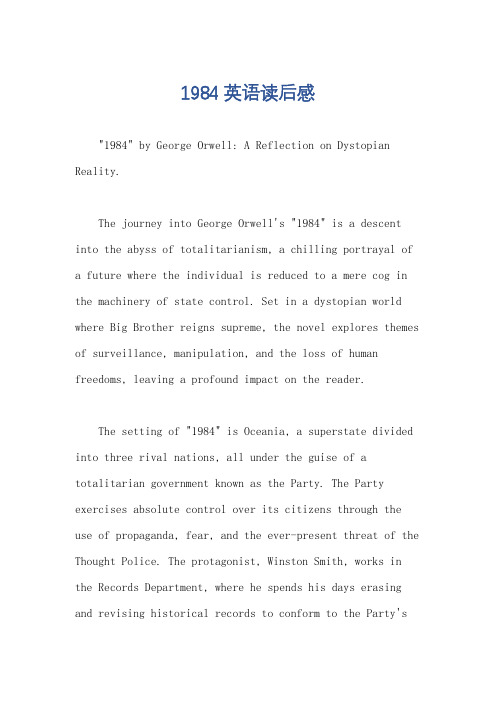
1984英语读后感"1984" by George Orwell: A Reflection on Dystopian Reality.The journey into George Orwell's "1984" is a descent into the abyss of totalitarianism, a chilling portrayal of a future where the individual is reduced to a mere cog in the machinery of state control. Set in a dystopian world where Big Brother reigns supreme, the novel explores themes of surveillance, manipulation, and the loss of human freedoms, leaving a profound impact on the reader.The setting of "1984" is Oceania, a superstate divided into three rival nations, all under the guise of a totalitarian government known as the Party. The Party exercises absolute control over its citizens through the use of propaganda, fear, and the ever-present threat of the Thought Police. The protagonist, Winston Smith, works in the Records Department, where he spends his days erasing and revising historical records to conform to the Party'sever-changing narrative. His life is a monotony of conformity and subservience, with the only respite being his illicit affair with Julia, another member of the Outer Party.The relationship between Winston and Julia serves as a stark contrast to the oppressive society they inhabit. Their love affair is a fleeting respite from the monotony and conformity of daily life, a brief moment of rebellion against the Party.。
1984读后感英文
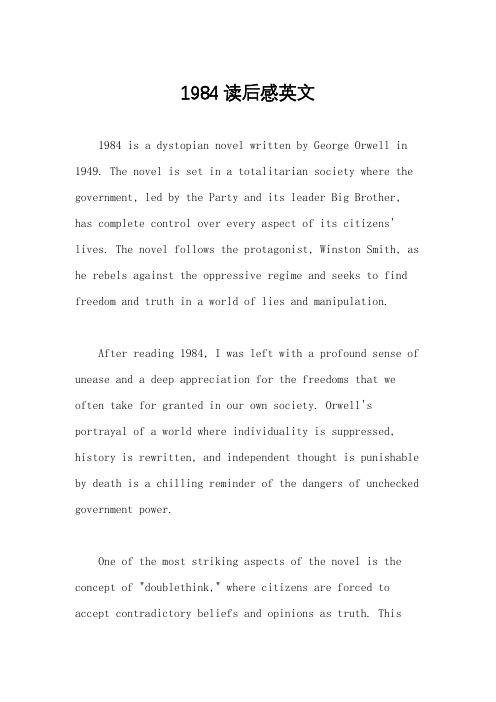
1984读后感英文1984 is a dystopian novel written by George Orwell in 1949. The novel is set in a totalitarian society where the government, led by the Party and its leader Big Brother, has complete control over every aspect of its citizens' lives. The novel follows the protagonist, Winston Smith, as he rebels against the oppressive regime and seeks to find freedom and truth in a world of lies and manipulation.After reading 1984, I was left with a profound sense of unease and a deep appreciation for the freedoms that we often take for granted in our own society. Orwell's portrayal of a world where individuality is suppressed, history is rewritten, and independent thought is punishable by death is a chilling reminder of the dangers of unchecked government power.One of the most striking aspects of the novel is the concept of "doublethink," where citizens are forced to accept contradictory beliefs and opinions as truth. Thismanipulation of reality serves to maintain the Party's control over its citizens and reinforces the idea that the truth is whatever the Party says it is. This manipulation of truth is a powerful commentary on the dangers of propaganda and the importance of critical thinking in a free society.The character of Winston Smith serves as a symbol of the human desire for freedom and the struggle against oppression. His journey from a loyal Party member to a rebellious dissident is a testament to the resilience of the human spirit in the face of adversity. Despite the constant surveillance and threat of punishment, Winston continues to seek out the truth and resist the Party's control, even at great personal risk.The novel's exploration of love and loyalty in a world where trust is a scarce commodity is also deeply moving. Winston's relationship with Julia, a fellow rebel, is a rare source of warmth and connection in a world that is cold and indifferent. Their love for each other becomes an act of rebellion in itself, as they strive to find momentsof intimacy and humanity in a society that seeks to crush any form of individual expression.Orwell's depiction of the Party's use of technology for surveillance and control is eerily prescient, given the advancements in surveillance technology in the years since the novel was written. The telescreens that are omnipresent in the novel, monitoring citizens' every move and word, are a haunting reminder of the potential dangers of unchecked government surveillance and the erosion of privacy rights.Overall, 1984 is a powerful and thought-provoking novel that continues to resonate with readers decades after its publication. Orwell's warning about the dangers of totalitarianism and the importance of defending individual freedoms is as relevant today as it was when the novel was first written. It serves as a stark reminder of thefragility of freedom and the constant vigilance required to protect it from those who seek to suppress it. I highly recommend this novel to anyone who is interested in exploring the darker side of human nature and the power of the human spirit to resist oppression.。
1984英语读后感
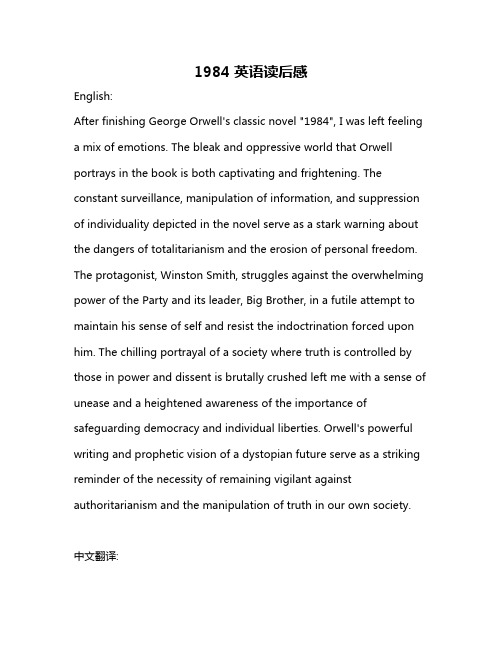
1984英语读后感English:After finishing George Orwell's classic novel "1984", I was left feeling a mix of emotions. The bleak and oppressive world that Orwell portrays in the book is both captivating and frightening. The constant surveillance, manipulation of information, and suppression of individuality depicted in the novel serve as a stark warning about the dangers of totalitarianism and the erosion of personal freedom. The protagonist, Winston Smith, struggles against the overwhelming power of the Party and its leader, Big Brother, in a futile attempt to maintain his sense of self and resist the indoctrination forced upon him. The chilling portrayal of a society where truth is controlled by those in power and dissent is brutally crushed left me with a sense of unease and a heightened awareness of the importance of safeguarding democracy and individual liberties. Orwell's powerful writing and prophetic vision of a dystopian future serve as a striking reminder of the necessity of remaining vigilant against authoritarianism and the manipulation of truth in our own society.中文翻译:读完乔治·奥威尔的经典小说《1984》,我心情复杂。
英语读后感1000字 (2)
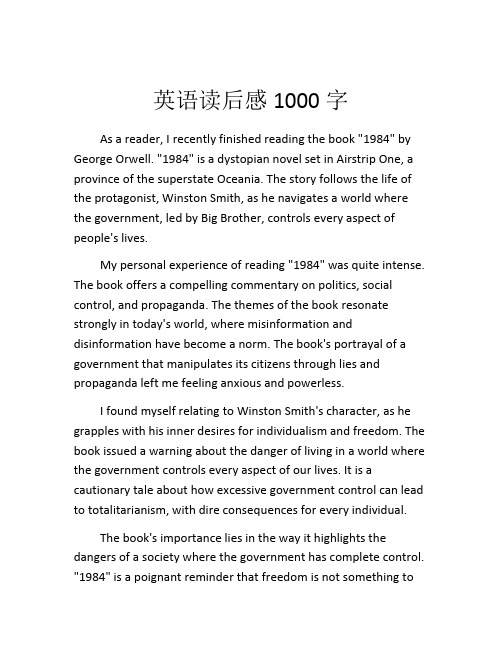
英语读后感1000字As a reader, I recently finished reading the book "1984" by George Orwell. "1984" is a dystopian novel set in Airstrip One, a province of the superstate Oceania. The story follows the life of the protagonist, Winston Smith, as he navigates a world where the government, led by Big Brother, controls every aspect of people's lives.My personal experience of reading "1984" was quite intense. The book offers a compelling commentary on politics, social control, and propaganda. The themes of the book resonate strongly in today's world, where misinformation and disinformation have become a norm. The book's portrayal of a government that manipulates its citizens through lies and propaganda left me feeling anxious and powerless.I found myself relating to Winston Smith's character, as he grapples with his inner desires for individualism and freedom. The book issued a warning about the danger of living in a world where the government controls every aspect of our lives. It is a cautionary tale about how excessive government control can lead to totalitarianism, with dire consequences for every individual.The book's importance lies in the way it highlights the dangers of a society where the government has complete control. "1984" is a poignant reminder that freedom is not something tobe taken for granted. It forces us to think about the importance of individualism, freedom of speech, and privacy. The book acts as a call to action for individuals to be vigilant and resist attempts at any government encroachment on our rights.The ideas discussed in "1984" are not just a product of Orwell's imagination; they resonate powerfully with real-life political regimes that have used similar tactics in the past. The book is a vivid illustration of the dangers of authoritarianism and the power of the government to manipulate people's thoughts and actions.My biggest takeaway from reading "1984" was the importance of being vigilant and fighting for our freedoms. We should never take our rights for granted and must remain ever watchful of the government's actions. The book serves as a stark reminder that totalitarianism can happen anywhere if we are not careful. It is a powerful call to action for people to remain ever vigilant and fight to preserve their freedom.In conclusion, "1984" is a book that everyone should read. It is a powerful warning about the dangers of living in a society where the government has total control. The book is relevant today more than ever, and we must take its message to heart. The book's importance lies in its ability to spark critical thinking and incite people to question authority. By reading "1984," we learn the importance of protecting our freedoms and standing up to any form of oppression, even if it requires great sacrifice.。
(完整word)1984读后感英文版 3

YOU。
ARE。
THE. DEAD。
Oh my God。
I got the chills so many times toward the end of this book。
It completely blew my mind. It managed to surpass my high expectations AND be nothing at all like I expected. Or in Newspeak "Double Plus Good。
”Let me preface this with an apology。
If I sound stunningly inarticulate at times in this review,I can't help it。
My mind is completely fried。
This book is like the dystopian Lord of the Rings, with its richly developed culture and economics, not to mention a fully developed language called Newspeak, or rather more of the anti-language, whose purpose is to limit speech and understanding instead of to enhance and expand it。
The world-building is so fully fleshed out and spine-tinglingly terrifying that it’s almost as if George travelled to such a place, escaped from it,and then just wrote it all down.I read Fahrenheit 451 over ten years ago in my early teens。
1984 英文读后感
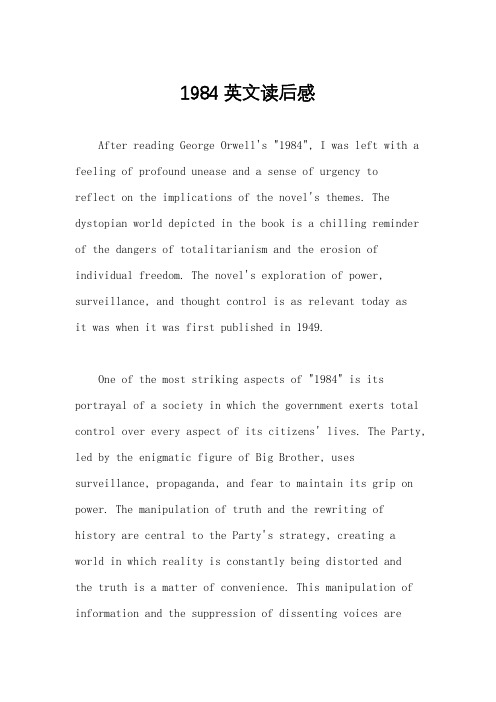
1984 英文读后感After reading George Orwell's "1984", I was left with a feeling of profound unease and a sense of urgency toreflect on the implications of the novel's themes. The dystopian world depicted in the book is a chilling reminder of the dangers of totalitarianism and the erosion of individual freedom. The novel's exploration of power, surveillance, and thought control is as relevant today asit was when it was first published in 1949.One of the most striking aspects of "1984" is its portrayal of a society in which the government exerts total control over every aspect of its citizens' lives. The Party, led by the enigmatic figure of Big Brother, uses surveillance, propaganda, and fear to maintain its grip on power. The manipulation of truth and the rewriting ofhistory are central to the Party's strategy, creating a world in which reality is constantly being distorted andthe truth is a matter of convenience. This manipulation of information and the suppression of dissenting voices arechillingly familiar in today's world of fake news and alternative facts.The novel's protagonist, Winston Smith, works at the Ministry of Truth, where he is tasked with rewriting historical documents to align with the Party's ever-changing version of the truth. His growing disillusionment with the Party's methods leads him to rebel in small, private ways, such as starting a forbidden diary and engaging in a forbidden love affair. However, Winston's rebellion is ultimately futile, and he is ultimately broken by the Party's relentless oppression. The novel's depiction of Winston's gradual descent into despair and hopelessness is a powerful reminder of the human cost of living under a repressive regime.The character of O'Brien, a high-ranking member of the Party who befriends Winston before betraying him, serves as a chilling embodiment of the Party's cruelty and manipulation. O'Brien's calm, rational demeanor and his willingness to use any means necessary to achieve theParty's goals are a stark contrast to the Party's officialpropaganda, which presents a benevolent and caring image. O'Brien's use of torture and psychological manipulation to break Winston's spirit is a harrowing reminder of the depths to which totalitarian regimes are willing to sink in order to maintain their power.One of the most haunting aspects of "1984" is its portrayal of the erosion of individual freedom and the destruction of personal relationships. The Party's control extends even to the most private aspects of its citizens' lives, and the novel's depiction of the surveillance state is eerily prescient in our age of constant digital monitoring. The Party's efforts to eradicate independent thought and enforce conformity are a chilling reminder of the dangers of groupthink and the suppression of dissent.The novel's exploration of the nature of truth and the power of language is also deeply thought-provoking. The Party's use of Newspeak, a language designed to eliminate unorthodox thoughts by limiting the range of expressible ideas, is a disturbing reflection of the ways in which language can be used to manipulate and control. The novel'sexamination of the relationship between language and power is a powerful reminder of the ways in which language can be used to shape our understanding of the world.In conclusion, "1984" is a powerful and thought-provoking novel that remains as relevant today as it was when it was first published. Its exploration of the dangers of totalitarianism, the erosion of individual freedom, and the manipulation of truth is a chilling reminder of the importance of remaining vigilant against the forces that seek to control and manipulate us. The novel's depiction of the human cost of living under a repressive regime serves as a powerful warning of the dangers of complacency and the importance of defending our freedom and autonomy. As I closed the book, I was left with a renewed appreciation for the importance of truth, freedom, and the power of individual thought.。
- 1、下载文档前请自行甄别文档内容的完整性,平台不提供额外的编辑、内容补充、找答案等附加服务。
- 2、"仅部分预览"的文档,不可在线预览部分如存在完整性等问题,可反馈申请退款(可完整预览的文档不适用该条件!)。
- 3、如文档侵犯您的权益,请联系客服反馈,我们会尽快为您处理(人工客服工作时间:9:00-18:30)。
1984 is not a particularly good novel, but it is a very good essay. On the novel front, the characters are bland and you only care about them because of the awful things they live through. As a novel all the political exposition is heavyhanded, and the message completely overrides any sense of storytelling. As an essay, the points it makes can be earthshaking. It seems everyone who has so much as gotten a parking ticket thinks he lives in a 1984-dystopia. Every administration that reaches for power, injures civil liberties or collaborates too much with media is accused of playing Big Brother. These are the successes of 1984's paranoia, far outliving its original intent as a battery against where Communism was going (Orwell was a severely disappointed Marxist), and while people who compare their leaders to Big Brother are usually overreaching themselves and speak far away from Orwell's intent and vision, it is a useful catchcloth for dissent. Like so many immortalized books with a social vision, 1984's actual substance is so thin that its ideologies and fear-mongering aspects can be stretched and skewed to suit the readers. If you'd like a better sense of the real world and Orwell's intents, rather than third-hand interpretations of his fiction, then his Homage to Catalonia is highly recommended.。
